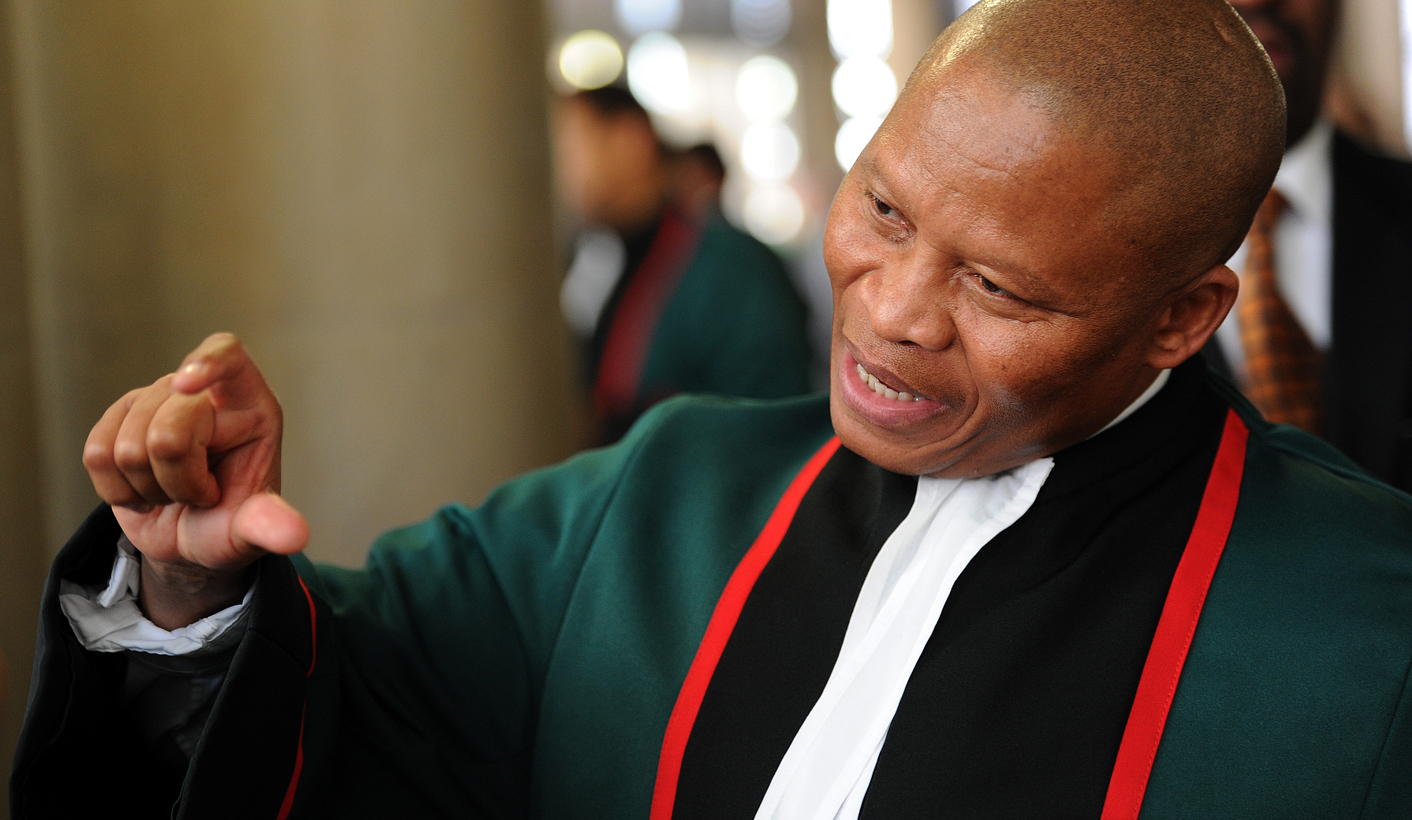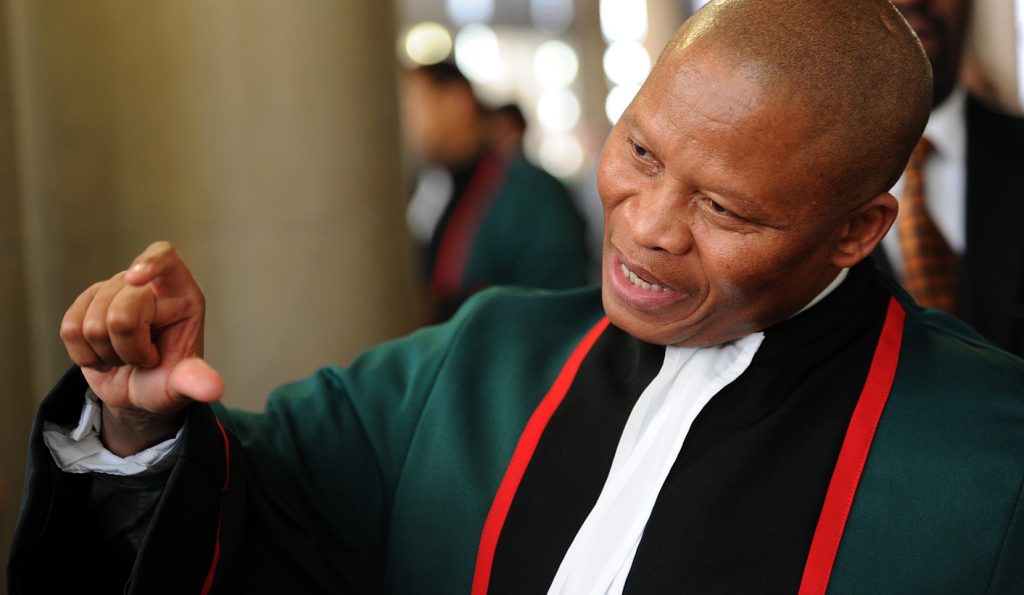Chief Justice Mogoeng Mogoeng released the annual report of the South African judiciary 2018/19 at a time when outrage over gender-based violence is leading many to call for increasingly harsh and immediate penalties for the crime.
But Judge Mogoeng avoided any populist endorsement of this sentiment — instead advocating more nuanced approaches to prosecution and arrests which might seem counter-intuitive in the current climate.
He warned, for instance, that the National Prosecuting Authority (NPA) should not rely on conviction rates as a performance yardstick.

Prosecutors, Mogoeng said, “don’t convict. Judicial officers do”.
The role of prosecutors is to “present cases and even support an acquittal where the interests of justice would be served by doing so. Not to pursue a conviction at all costs”.
The Chief Justice asked the police “to consider arrest and detention only when it is essential to do so” as a way to free up magistrates and courts to finalise trials.
He also said that although imposing “firm” sentences in cases involving gender-based violence was a “major deterrent factor”, it was not the most effective form of deterrence. He said international research had proved that the best deterrence was achieved through “certainty or predictability of detection, prosecution and conviction if the evidence allows”.
The issue of gender-based violence had clearly been foremost on the Chief Justice’s mind, however, as he proposed a suite of measures designed to improve the South African judicial system’s handling of such cases.
These included a public awareness campaign to inform the public on how to report incidents of such violence, and measures to ensure that the “discouraging and humiliating” features of reporting are minimised.
Mogoeng called for specially trained individuals to manage every part of the process, from investigating officers and prosecutors to judges and interpreters. Training these officials specifically in issues around gender-based violence, the Chief Justice suggested, will allow them to handle these cases “with the expertise, sensitivity, professionalism and special competence they deserve”.
But Mogoeng also pointed out that by the time police and courts take on these cases, society has already failed their victims.
“The criminal justice system deals only with the symptoms or offshoots of what really lies at the heart of a deeply troubled society,” Mogoeng said.
“Broadly speaking, it is no exaggeration to say that we are a sick society. Our sickness is responsible for this atrocious behaviour and must be properly diagnosed for effective medication or treatment to be dispensed and for the sickness itself to be permanently uprooted.”
The Chief Justice also sought to draw attention to the strain placed on judges and magistrates by having to deal with such cases.
“The stress on judicial officers which, as a result of some of the traumatising cases like rape, murder, difficult divorce matters that we have to handle and attacks of all kinds by aggrieved litigants or similarly situated people and others, requires the introduction of a judicial wellness or stress-management programme,” he said. “It cannot be left to an individual judicial officer to fend for herself or himself.”
While Mogoeng did not directly address recent allegations by the EFF that the South African judiciary is “captured”, he said all allegations of corruption against judges are closely examined.
Mogoeng acknowledged, however, that “neither the JSC nor the chief justice has the legal authority to peer into the bank accounts” of judges: something he said should be maintained out of respect for legal due process.
The Chief Justice also conceded that six cases of alleged misconduct involving judges have yet to be resolved, because of “a series of legal challenges that led to inordinate delays that nobody could have done anything about”.
When it comes to the composition of the bench, Mogoeng said that there are still too few female judges, particularly at senior levels in the higher courts.
The report reveals that racial transformation of the judiciary has been more successful: the majority of judges across the superior courts are now black African (114 out of 246) though white judges are still disproportionately represented, at 82.
While the release of the annual report provided an opportunity for Mogoeng to ruminate on the general state of the justice system, its primary purpose was to disclose the performance of the courts over the past year.
The best-performing courts in terms of efficiency were revealed as the Electoral Court and the Supreme Court of Appeal, though the former has relatively little to do: only four cases came before it over the 2018/2019 period.
Justice generally moves slowest in the Labour and Land Claims courts. But the worst-performing court of all is one of the least busy: the Competition Appeal Court managed to finalise just four out of seven cases over the past year. The Labour Court in Johannesburg is also the worst offender when it comes to reserving judgments for more than six months, with 37 of such judgments outstanding as of 31 March 2019.
The Constitutional Court failed to meet its target of finalising 80% of cases before it over the period under review, managing 76%.
This, Mogoeng said, was due to the court’s status as the point of final appeal on all matters — resulting in a hefty workload — and the “increasingly complex matters, including those of a highly political character” brought before it.
Not all the delays in finalising cases are due to judges. One factor singled out by the Chief Justice’s report as critical is the ongoing failure to fill vacant positions within the NPA.
“The 665 posts for prosecutors which remain vacant will weaken court performance even more,” the report warns.
Mogoeng’s most scathing critique was reserved for officials from the Department of Public Works when it comes to the upkeep of judicial buildings.
“I am not aware of any department serviced by [Public Works officials] that has expressed overall satisfaction with their performance,” Mogoeng said.
“I believe the time has come to examine very closely the commitment of these officials to discharging the responsibilities they are paid for in line with the basic values and principles governing public administration.”
He expressed gratitude, however, to Public Works Minister Patricia de Lille for her “conscientiousness and deliberate speed” in intervening to address the failings of errant officials.
One of Mogoeng’s preoccupations since taking office has been the digital upgrading of the judicial system. He expressed enthusiasm on Thursday that progress is being made in this regard. Information relating to the progress of cases will be made available online, with a pilot programme to be rolled out in Gauteng.
“Smartphones and iPads would then be the tools we use to check on the performance of any of our courts, anytime, regardless of where in the world we might be,” he said.
Mogoeng also dropped an intriguing hint as to an attempt to “capture” the judiciary by an unnamed person offering to fund towards the courts’ digital migration.
“I was approached by somebody offering R600-million so that we can modernise, but I know that person, I know that institution,” the Chief Justice said.
“I rejected it with the necessary contempt, because that is how capture happens.” DM

